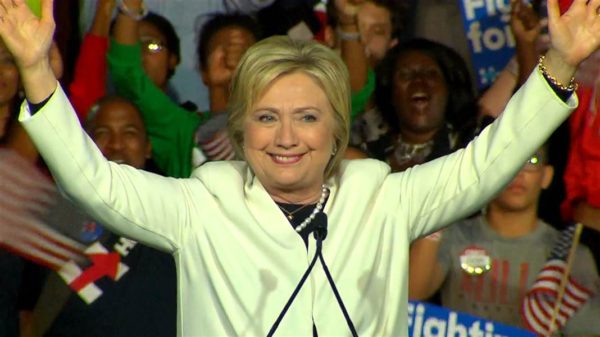

The reason so many superdelegates overwhelmingly endorsed Hillary Clinton so early is perhaps the most important detail everyone missed in Donna Brazile’s book.
In a jaw-dropping excerpt of her new book Hacks, former interim DNC chair Donna Brazile shockingly revealed that Hillary Clinton’s presidential campaign had complete control of the Democratic Party’s operations and financing long before any voters had cast their ballots.
Ultimately, disgraced former DNC chair Rep. Debbie Wasserman Schultz (D-Florida) surreptitiously handed over control of the DNC to the Clinton campaign in exchange for the Clinton campaign’s fundraising prowess, with the understanding that the former Secretary of State would help bring the DNC out of the massive amount of debt the party incurred in its efforts to re-elect former President Barack Obama.
But the deciding factor in determining Hillary Clinton’s early lead was her commanding dominance in the number of superdelegate endorsements she had racked up by early 2016. According to Brazile’s account of events, these early endorsements may have been due to the Hillary Victory Fund — an elaborate joint fundraising agreement that both DNC CEO Amy Dacey and Clinton campaign manager Robby Mook signed:
Individuals who had maxed out their $2,700 contribution limit to the campaign could write an additional check for $353,400 to the Hillary Victory Fund—that figure represented $10,000 to each of the 32 states’ parties who were part of the Victory Fund agreement—$320,000—and $33,400 to the DNC.
In February of last year, The Guardian’s calculations were 355 superdelegates for Clinton to just 14 for Senator Bernie Sanders (I-Vermont). Because 437 of the 712 superdelegates at the Democratic National Convention were made up of DNC members, along with the chairs and vice-chairs of each state’s respective Democratic Party organization, and because the Clinton campaign controlled the DNC’s finances, it’s easy to deduce that state party officials who wanted money from the DNC for their down-ballot candidates were implicitly required to endorse Clinton in order to get help for state and local races.
By the time Clinton officially secured the 2016 Democratic presidential nomination, superdelegates had made a clear difference. While Clinton had a pledged delegate count of 2,205 to Sanders’ 1,846, she demolished him in superdelegates. Almost all of the DNC-affiliated superdelegates endorsed Clinton, even in states where Sanders clearly won the popular vote.

In the Wyoming caucus, for example, Sanders won by a 56-44 margin, though Clinton still ended up with 11 of the state’s 18 total delegates, due to unanimous support from superdelegates. Wyoming’s Democratic Party was one of the 32 state parties receiving money from the Hillary Victory Fund. And because Wyoming Democrats are running in a solidly Republican state, party officials are likely more dependent than other states on help from the DNC in order to raise money for their candidates.
Of course, it goes without saying that Sanders, who openly ran against the political establishment, likely ruffled more than a few feathers among DNC elites, making superdelegate endorsements extremely rare. But given the new details revealed by Brazile, it’s easy to see how the promise of critical election funds would convince superdelegates who were on the fence about Clinton to come to her side in order to bolster down-ballot candidates’ chances.
Carl Gibson is the publisher of Grit Post. His work has previously appeared in The Guardian, Al Jazeera-America, NPR, The Washington Post, and others. Follow him on Twitter @crgibs or email him at carl AT gritpost DOT com.
more recommended stories
 Over 300 People Facing Federal Charges For Crimes Committed During Nationwide Demonstrations
Over 300 People Facing Federal Charges For Crimes Committed During Nationwide DemonstrationsThe Department of Justice announced that.
 Democrats’ Efforts To Destroy The Second Amendment Will Be Fought
Democrats’ Efforts To Destroy The Second Amendment Will Be FoughtWASHINGTON – U.S. Senator Lindsey Graham (R-South.
 Biden-Nominated Attorney Rachael Rollins Violated Ethics Laws
Biden-Nominated Attorney Rachael Rollins Violated Ethics LawsWASHINGTON—House Committee on Oversight and Accountability.
 US ‘Accidentally’ Sends $6.2 Billion to Ukraine
US ‘Accidentally’ Sends $6.2 Billion to UkraineJune 20 (Reuters) – The Pentagon.
 Senator Atkins Introduces Bill to Strengthen Protections for Abortion, Gender-Affirming Care Providers in California
Senator Atkins Introduces Bill to Strengthen Protections for Abortion, Gender-Affirming Care Providers in CaliforniaMarch 21, 2023 SACRAMENTO – Senate President.
 Statement on President Carter’s Health – The Carter Center
Statement on President Carter’s Health – The Carter CenterATLANTA (Feb. 18, 2023) — After.
